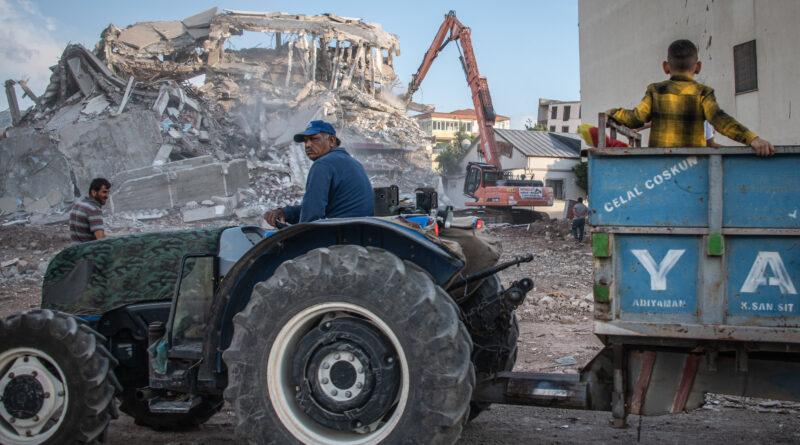Trauma and deprivation in the aftermath of the Turkey-Syria earthquake
Months after a magnitude 7.8 earthquake hit Turkey and Syria, untold thousands of traumatised survivors are living in tents or containers with no prospect of employment or a swift return to their homes or alternative housing. Boštjan Videmšek spoke to some of them.
“It was like the worst nightmare. It was absolute horror. Once the shaking started, we ran outside, where it was raining heavily. It was also cold and pitch dark. People were screaming everywhere. It was hour after hour of pretty much the apocalypse,” Maryem Kalkan, 54, related at the tent settlement that had formed in the earthquake's wake in a small park on the outskirts of Antakya.
With the break of dawn, Maryem thought the worst was behind her. Then, a few hours later, the ground shook again.
Antakya and the entire Hatay province got the worst of it. The old city center was almost entirely razed. The newer apartment blocks collapsed as if made of cardboard. A wonderful city of great cultural heritage was wiped out. And with it, thousands upon thousands of people.
In total, the 6 February earthquake that hit southwestern Turkey and a part of northwestern Syria claimed more than 55,000 lives. Tens of thousands more were injured and 3 million people lost their homes. According to the EU's humanitarian aid organisation, the earthquake directly affected more than 9 million people spread out over eleven provinces.
As the first humanitarian assistance took an entire week to reach northern Syria, the people there had it even worse. Many of them were forced to try to dig out their relatives with their bare hands. Even now, the survivors are entirely reliant on humanitarian aid.
___________
For the first 10 days after the earthquake, Maryem Kalkan and her relatives slept out in the open. It took some time before Maryem fully realised the extent of the catastrophe. After a week, a rescue team dug up the corpse of her father. Then the husband of her pregnant daughter was found, also dead.
Maryam tried to describe her losses with a survivor's stoicism. But tears quickly overpowered her.
Her house in the Defne neighbourhood was badly damaged. “It is slowly collapsing,” she related. “Since sooner or later the local authorities are sure to tear it down, it's lost to us forever.”
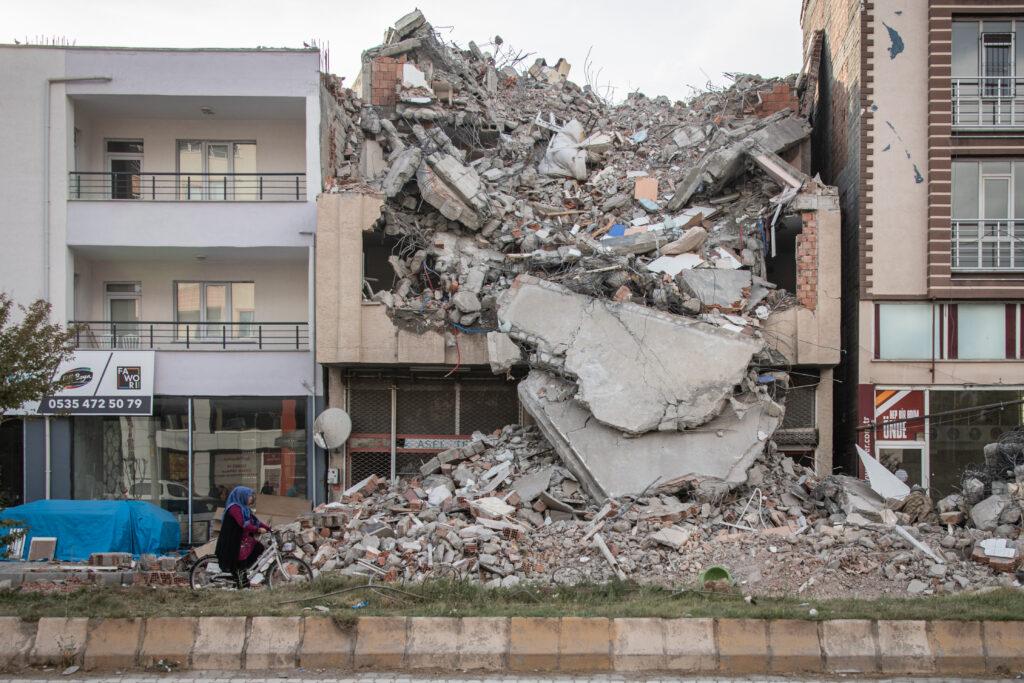
Image: ©Diego Cupolo, EU
In Antakya alone, some 20,000 houses and buildings were razed or permanently rendered uninhabitable. Bulldozers are still sifting through what remains of the city. In front of their damaged homes, the survivors are carting off the rubble in a decidedly Sisyphean fashion, knowing full well the authorities are certain to tear down what remains of their homes. Children are rummaging through the wreckage. Ancient mule-drawn carts are loaded with potentially useful belongings.
Along with the landscape, the cityscape had been altered beyond recognition.
Antakya is riddled with craters, as if it had been carpet bombed to near oblivion. The city centre is reminiscent of western Mosul after the Islamic State (ISIS) and the Iraqi government forces got locked into a maelstrom of destruction. Scores of automobiles, bent and twisted out of shape, are strewn along the edges of what used to be asphalt roads. With every other step, one risks tripping over another pile of concrete and ironwork, or being run over by a tanker truck slaloming through it all, desperately trying to supply drinkable water to where it is most needed.
Starving dogs are roaming the post-apocalyptic scene, searching for food. But their wits are no match for the cats, who now also have the advantage in numbers.
A deep sense of trauma
In the Hatay province, some 40,000 companies were either temporarily or permanently closed down on account of the disaster. Collective unemployment has become the order of the day for the vast area affected. The earthquake also laid waste to the renowned Antakya bazaar, now relocated to the outskirts of the city. The former site is now filled with light-blue housing containers.
It is as if Year Zero had been declared all over Turkey's southwestern regions. Much of its physical history was erased, and a feeling of slapdash temporariness is now visible everywhere.
“We no longer feel like beggars when we're receiving help. We somehow accepted we'd lost everything,” Maryem Kalkan reflect as she stands in front of her tent in the blistering afternoon heat, her brother beside her, holding on to a whimpering doberman. Like most here, she lost both her home and employment prospects, rendering her entirely reliant on humanitarian relief.
Local and international humanitarian teams are regularly supplying the survivors with food, water and medicine. Unfortunately, the relief available is not sufficient to help everyone. The crisis is simply too vast. “The need for aid is stupendous and unmanageable,” said Ali Fuah Sütlü, the programme director for Concern, a humanitarian organisation.
“All of us here at the park share the same experience,” Maryem related. “The earthquake didn't choose its victims. So we now share a strong sense of solidarity.”
Before the cataclysm, Maryam made her living as a cook, cleaner and walnut picker. Both Maryam and her brother were adamant they had no intention of moving to the container settlements. Having sprung up all over the disaster area, these settlements now house some 600,000 souls. The rest of the victims – meaning more than 2 million people – now live in tent camps. Their reasons range from fear of inhabiting a confined space to hope that they might be allowed to return to their homes, if the rebuilding process is swift enough.
“I no longer dare enter a house. Any house. As soon as I try, I panic. I can't help it. I start thinking the ground might shake again. I guess it has a lot to do with the constant aftershocks,” admitted Maryem as the air around her filled with the aroma of freshly baked bread. “There's also much looting and destruction going on all over the city. At least here in the tents, we are safe. And most importantly, we are together.”
A deep sense of trauma pervades both the containers and the tents. There is a daily struggle for personal space, and fears of violence and disease run high.
Starting From scratch
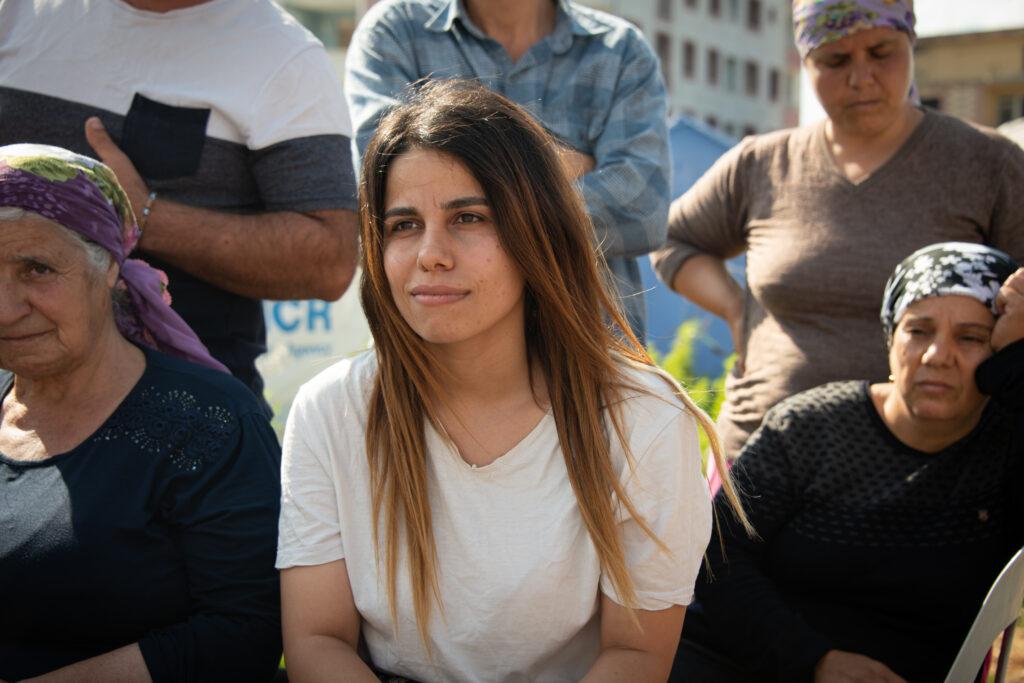
Image: ©Diego Cupolo, EU
Seren Reyhangoulari, 23, also assured me she and her 35-strong extended family had no intention of moving to the container settlements, whose inhabitants seem doomed to remain there for at least the next few years.
“Here in the tents, we are together,” she related. “And we really want to stay together. It's the one thing we've got left – each other.”
Before the upheaval, Seren used to work as a teacher at a private school. And now not a single one of her relatives huddling with her on the outskirts of Antakya has a job. Surviving on social and humanitarian relief, they are crammed into six tents. But compared to a mere plastic sheet grabbed from a local greenhouse, the tents almost seem like a luxury.
“We had to wait a very long time for these tents and for first aid,” Seren recalled. “Since we're not from downtown and since we refuse to move to the containers, we seem to have been forgotten. The house where I used to live is only moderately damaged and can certainly be repaired. But where do we get the money? We would be required to contribute 40% of the cost, which means all of us would have to go into debt for several generations to come.”
The words kept pouring out of Seren, who experienced the earthquake while riding the bus. The event left her profoundly traumatised. Her niece had both of her legs amputated. Seren has also joined the long list of those who no longer dare to enter any sort of building. But even if Seren was psychologically capable of finding new housing, she couldn't begin to afford it. After the earthquake, local rents shot up by a factor of two to four. A kind of ‘war economy' is in full swing.
One also has to take into account the general economic crisis Turkey has been struggling with for the past several years. After last year's unconscionable 88% inflation, price rises for this year are currently estimated at 44%. Much of their savings have already been swept away, while food prices are sky-rocketing.
As always, the brunt of the economic collapse is borne by society's most vulnerable. In the areas affected by the cataclysm, there is now very little informal work to be had, though it normally forms a very important part of the Turkish economy. The simple fact is that there is no work, save for demolition and clean-up projects. But these belong to well-connected private firms with strong ties to the local and central authorities.
Incidentally, in the months after the upheaval, hundreds of residents of the Hatay province received a text message from the authorities informing them that a presidential decree had seized their land, so they were required to move out immediately. All in the name of renewal.
“Our lives are gone. Everything has changed. All of us here, we're starting from scratch. Our personalities have also changed. I am now a lot more hot-tempered, restless, quick to flare up,” Seren Reyhangoulari continued.
Sitting next to her was her relative Feride, who was in the final stages of pregnancy. With mere week left before her delivery date, she was slowly drowning in anxiety. Feride knew that her life was certain to get even tougher than it already was. But even after the delivery, she had no intention of relocating to the containers.
“We shall stay together,” she insisted, while cats and hens teemed around the tents donated from China and Pakistan. “I can only hope the authorities will help improve our living conditions. You know, we see snakes all the time here. The children are terrified. They scream and cry. We're all covered in insect bites. We've only recently got a portable toilet, but it still hasn't been connected to the sewers. But there are many who have it even worse than us.”
War and pieces
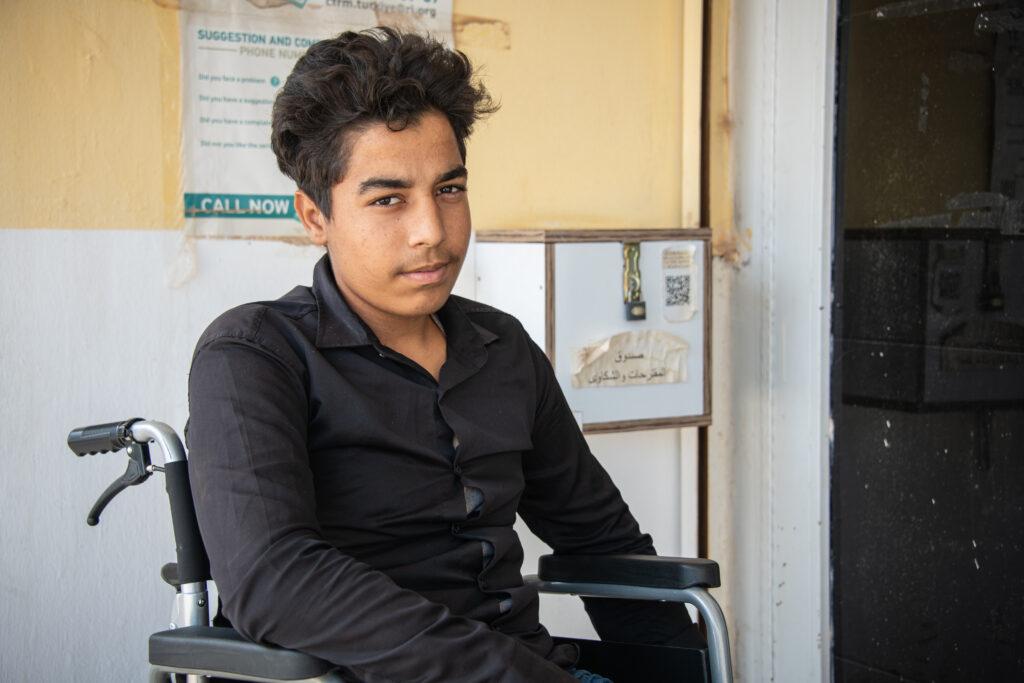
Image: ©Diego Cupolo, EU
Sadly, Feride was right about others having it even worse. The February earthquake also brutally affected almost 2 million Syrian refugees. Just as they were finally picking up the pieces of their broken lives after their flight from a particularly savage war, the shockwaves from the natural disaster sent them reeling. And just like that, they were hanging on for dear life again.
“For me, the earthquake was a moment of fear and death. In my quarter several houses were destroyed. Fortunately, ours was only damaged. I have now survived a bombing and an earthquake. Which means I must have a future,” a 15-year-old named Abdul Hakim explained quietly.
I met Abdul Hakim at the National Syrian Project for Prosthetic Limbs centre in Reyhanli, right beside the Syrian border. In 2013, when he was still a young child, the handsome, dishevelled teenager lost both his legs in a Syrian regime air raid in the vicinity of Hama. One of his legs had to be amputated under the waist, the other under the knee.
After the raid which claimed the life of his father, Abdul Hakim and his badly wounded mother were taken to Turkey. It took two years for him to be issued with a pair of prosthetic limbs. At the centre, which is managed by Relief International, Abdul Hakim learned to walk again and finished primary school.
Then the coronavirus pandemic struck.
According to his psychotherapist, the lack of social contact plunged the boy into a severe depression. Overwhelmed by his traumas, Abdul Hakim started having panic attacks. He took off the two prostheses enabling him to experience a semblance of normalcy and place them in a corner. His mother, who had also recovered in Turkey, could no longer get him to leave the rented apartment. The boy quit his schooling and stopped coming to physiotherapy.
Then the ground started to shake. Abdu Hakiml's mother, brothers and sisters were somehow able to get him out of the flat. They spent the next few days waiting for help in the cold wet streets. An uncle driving in from devastated Antakya ultimately came to their rescue. He brought help and moved in with the family in their slightly damaged apartment.
In Abdul Hakim's own words, the earthquake woke him up, jolted him out of his downward spiral. He realised that his unwise decisions in the pandemic's wake could have cost him his life. So he started using his prosthetic legs again and returned to physiotherapy again.
“I would also very much like to resume my schooling. One day, I would like to become an architect, like my uncle. My wish is to build houses for people. And also hospitals and schools,” Abdul Hakim said with a big smile.
A Huge failure in solidarity
After the earthquake, the vast majority of Syrian refugees had to move to the informal tent cities which had sprung up across the towns and villages – mostly as the upshot of improvisation and the sheer will to survive. Yet four and a half months later, there was nothing to suggest that the refugees' lot was about to improve.
In fact, it was quite the contrary. Some 99 percent of all those relocated to containers by the authorities were of Turkish descent. Syrian refugees who applied for housing in a container had virtually no chance of actually moving into one, according to sources we spoke to in the humanitarian community.
This reflects a huge failure in the Turkish government's solidarity with the refugees. And so the poor Syrians were forced to endure life out in the open, braving all kinds of weather while being threatened with eviction by the opposition presidential candidate Kemal Kılıçdaroğlu during his infamously racist campaign.
Fear is not forever
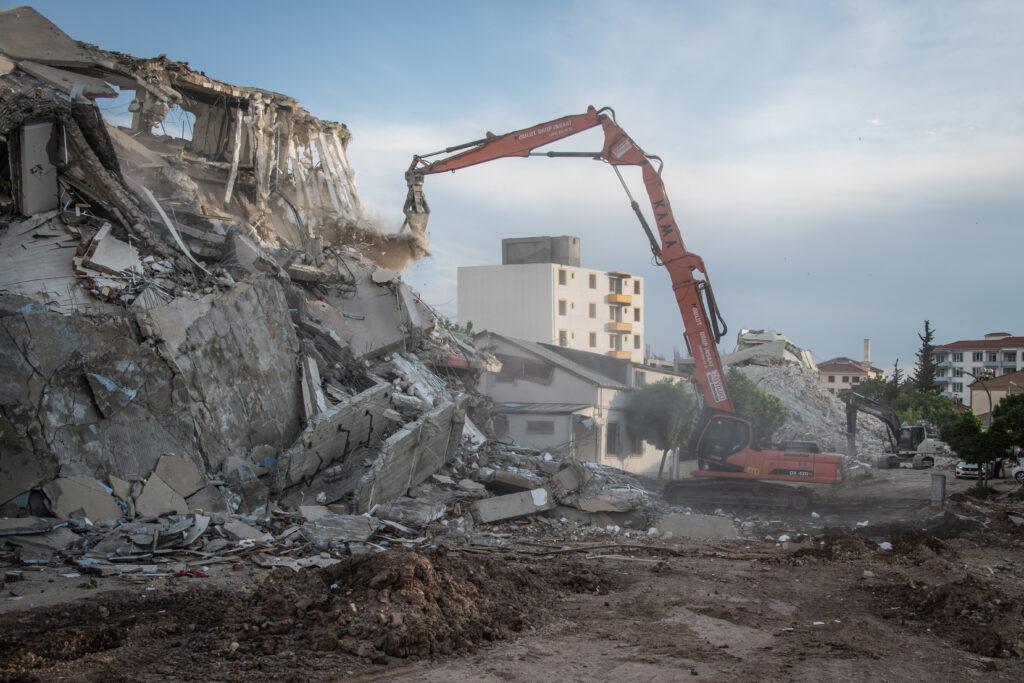
Image: ©Diego Cupolo, EU
One of the towns most savagely affected by the earthquake was Nurdağı in the Gaziantep province.
A large part of the town was flattened and is certain to remain uninhabitable for years to come. But at the time of our visit – with iron, concrete and the victims' belongings still strewn everywhere – the most devastated of the Nurdağı neighbourhoods already boasted a pair of garishly lit businesses. One was a beauty salon and the other a gold dealership.
Many residents have been relocated to the huge container city atop a nearby plateau. We arrived at the settlement as the school year was entering its final week. With a number of psycho-social workshops for schoolchildren taking place, the hilltop was ringing with laughter.
The first group of children had just launched a number of paper planes up into the sky, after having written down their greatest fears on the paper forming the planes' sides.
“We want to let them know that fear is not forever, and also that their pain is not forever,” explained Gizem Özgün, a child protector officer with UNICEF. “Most of these children have been profoundly traumatised. They refuse to enter buildings. Actually, it is pretty difficult to get them to go anywhere. We've seen a great deal of depression, anxiety, bed-wetting, insomnia, eating disorders and aggression. It is even worse with the teenagers, who were unable to go back to school, since all the secondary schools were destroyed.”
“So what's your biggest fear?” I asked a small boy wearing a Karim Benzema football shirt.
“Earthquakes,” the lad sad, smiling shily. “But the teachers told me that today, all my fears have flown up and away.”
As he told me this, he finally succeeded in what he was trying to accomplish for a good long while, which was to fly a plastic kite. On it, he had been instructed to write down all his dearest wishes.
He told me he had only put down one: “No more earthquakes.”

